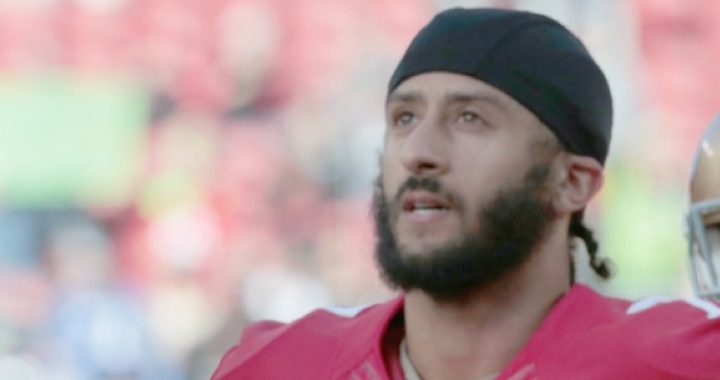
“I think he should be on a roster right now,” Green Bay Packers quarterback Aaron Rodgers told Mina Kimes of ESPN in a recent interview, referencing former San Francisco 49er quarterback Colin Kaepernick. “I think because of his protests, he’s not.”
The “protests” that Rodgers referred to were the multiple times that Kaepernick took a knee during the playing of the national anthem before NFL games.
Rodgers made clear that he, however, would continue to stand for the playing of “The Star Spangled Banner.” “I’m gonna stand because that’s the way I feel about the flag — but I’m also 100 percent supportive of my teammates or any fellow players who are choosing not to. They have a battle for racial equality. That’s what they’re trying to get a conversation started around.”
According to Rodgers, the “conversation” these players are attempting to start by publicly kneeling during national anthem includes “any number of issues” that black players have to deal with. “I think the best way I can say this is: I don’t understand what it’s like to be in that situation. What it is to be pulled over, or profiled, or any number of issues that have happened, that Colin was referencing — or any of my teammates have talked to me about…. But I know it’s a real thing my black teammates have to deal with.”
Last season, Kaepernick explained his protest this way: “I am not going to stand up to show pride in a flag for a country that oppresses black people.”
In fact, while the controversy has centered on the playing of the national anthem, it has been somewhat overlooked that Kaepernick’s problem is really with the entire country. He has a special beef with the police: “Cops are getting paid leave for killing people,” he insisted.
But Kaepernick is inconsistent in opposing those who “kill people.” During last year’s controversy it was revealed that Kaepernick had high regard for the late Fidel Castro, the Cuban communist dictator who killed thousands of people during his long reign.
It is uncertain what Rodgers would say about Kaepernick praising a mass murderer. It is a sad commentary on our times that one can imagine that a player who waved a small Confederate flag during the playing of the national anthem, perhaps to protest the taking down of Confederate monuments, would probably not get Kaepernick’s public support. In fact, it is likely that any player who did that would probably never play another down in the National Football League. One can probably safely presume that Rodgers would not argue for that player’s reinstatement.
And the media who are now rushing to Kaepernick’s defense would no doubt praise the swift termination of that player’s contract.
Yet, are they really prepared to say that Fidel Castro was a better person than Robert E. Lee?
Rodgers said in the interview that “a fear of job security” can inhibit a player from freely expressing his views. Kaepernick had a terrible year with the 49ers last season, but some argue that he is being “blackballed” for his political views, mistakenly contending that his “First Amendment right of free speech” is being curtailed. Actually, the First Amendment was written to prohibit Congress from passing any law abridging the freedom of speech. It does not apply to a business firing an employee for making political statements that the business disagrees with.
The reality is that individuals are fired every day in America for their political or social views. Google, for example, recently fired an employee, James Damore, who simply wrote a memo on gender diversity. Damore confirmed that he was terminated as an engineer at Google for“perpetuating gender stereotypes.” Then there was the CEO of Mozilla Firefox, who was forced out because he donated money to the referendum in California that put into the state Constitution that marriage is between a man and a woman — a referendum that garnered the majority of the vote!
Those on the Left tended to support those firings, arguing that the expression of such views can hurt the public image of the company, making the terminations justified. But not playing a football player because he disrespects the country and praises a communist dictator is somehow a violation of the First Amendment? The TV ratings for the NFL were significantly down last year, and NFL executives blamed everything but the anger of many fans who watched in disgust as several of the NFL’s employees publicly dissed their country.
Most business owners respect their employees’ political views, and judge them by their job performance instead, However, in a free country, they do not have to. After all, they have their rights, too, and they do not want an employee who runs off customers.
Photo of Colin Kaepernick: AP Images



